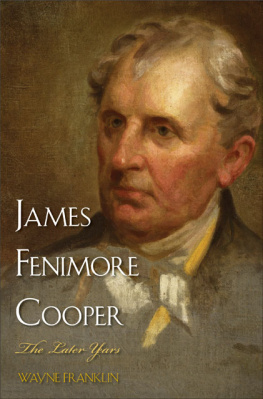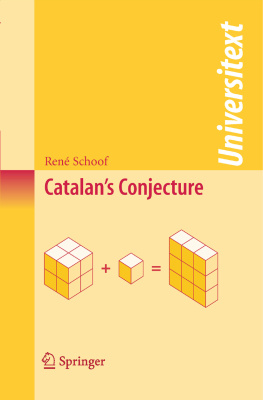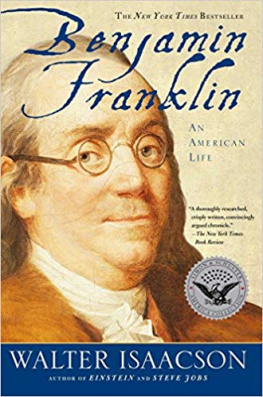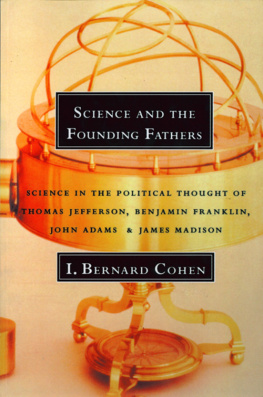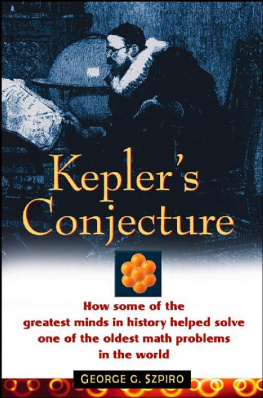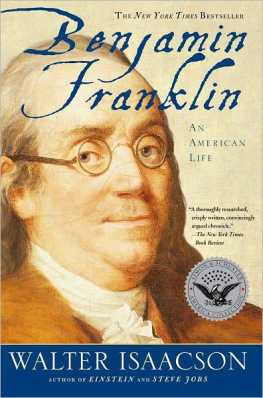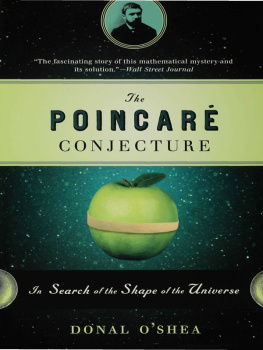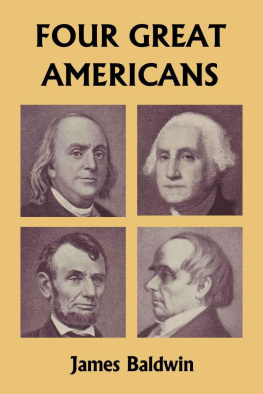James Franklin - The Science of Conjecture
Here you can read online James Franklin - The Science of Conjecture full text of the book (entire story) in english for free. Download pdf and epub, get meaning, cover and reviews about this ebook. year: 2015, publisher: Johns Hopkins University Press, genre: Romance novel. Description of the work, (preface) as well as reviews are available. Best literature library LitArk.com created for fans of good reading and offers a wide selection of genres:
Romance novel
Science fiction
Adventure
Detective
Science
History
Home and family
Prose
Art
Politics
Computer
Non-fiction
Religion
Business
Children
Humor
Choose a favorite category and find really read worthwhile books. Enjoy immersion in the world of imagination, feel the emotions of the characters or learn something new for yourself, make an fascinating discovery.

- Book:The Science of Conjecture
- Author:
- Publisher:Johns Hopkins University Press
- Genre:
- Year:2015
- Rating:3 / 5
- Favourites:Add to favourites
- Your mark:
- 60
- 1
- 2
- 3
- 4
- 5
The Science of Conjecture: summary, description and annotation
We offer to read an annotation, description, summary or preface (depends on what the author of the book "The Science of Conjecture" wrote himself). If you haven't found the necessary information about the book — write in the comments, we will try to find it.
James Franklin: author's other books
Who wrote The Science of Conjecture? Find out the surname, the name of the author of the book and a list of all author's works by series.
The Science of Conjecture — read online for free the complete book (whole text) full work
Below is the text of the book, divided by pages. System saving the place of the last page read, allows you to conveniently read the book "The Science of Conjecture" online for free, without having to search again every time where you left off. Put a bookmark, and you can go to the page where you finished reading at any time.
Font size:
Interval:
Bookmark:
The Science of Conjecture
2001, 2012, 2015 The Johns Hopkins University Press
All rights reserved. Published 2001
Johns Hopkins Paperbacks edition, 2002, 2015
Printed in the United States of America on acid-free paper
2 4 6 8 9 7 5 3 1
Johns Hopkins University Press
2715 North Charles Street
Baltimore, Maryland 21218-4363
www.press.jhu.edu
The Library of Congress has cataloged the hardcover edition of this book as follows:
Franklin, James, 1953
The science of conjecture : evidence and probability before Pascal / James Franklin.
p. cm.
Includes bibliographical references and index.
ISBN 0-8018-6569-7 (alk. paper)
1. ProbabilitiesHistory. 2. EvidenceHistory. I. Title.
QA273.A4 F73 2001
519.09dc21 00-042429
ISBN 978-1-4214-1880-3
A catalog record for this book is available from the British Library.
Errata
P. 130 The discovery of the black swan dates to after Burgersdijcks Logic. P. 177 The procedure involving random sampling was a quality-control method in the Mint, but not the one called the trial of the pyx.
The first edition of The Science of Conjecture reconfigured the field of the history of probability in two ways. The first concerned a wider than usual conception of the nature of probability. The second involved a Renaissance-free view of the history of Western ideas. In the decade since the books publication, the first of these has gained traction, the second has not.
The books conception of the subject matter stemmed from an objective Bayesian (or logical probabilist) theory of probability. According to that theory, as developed by Keynes in his Treatise on Probability and by later authors, the main notion of probability is of an objective logical relation holding between a body of evidence and a conclusion. The body of evidence available in court does or does not make the defendants guilt highly probable; the known facts do or do not support the theory of global warming, irrespective of any contingent facts about the world or what anyones opinion is. Logical probability may or may not be numerical; even if it is, qualitative or approximate judgments are often of most importance.
That perspective opened up all kinds of evaluation of uncertain evidence as the natural subject matter of a history of probability. Thus, The Science of Conjecture focused on the law of evidence, which, over many centuries of thought, especially in medieval Roman law, had developed evidential concepts like the modern proof beyond reasonable doubt. Moral theory and business were also familiar with concepts of probabilities and risks, mostly quantified only loosely.
During the late twentieth century, debate on interpretations of probability largely took the form of pitched battles between frequentists and related schools (who held that probability dealt with relative frequencies or objective propensities) and subjective Bayesians (who took probability to be about degrees of belief, subject to some constraints).
Public understanding of the Bayesian perspective was advanced by Sharon Bertsch McGraynes semipopular 2011 history, The Theory That Would Not Die.in a more or less objectivist form, over frequentism. The revival of Bayesianism, it argued, was driven by practice more than theory, beginning with Alan Turings use of Bayes Theorem in World War II cryptography and given momentum by the availability of sufficient computing power to calculate results of the formula on large databases. That view of the story sees Bayesianism as essentially about a numerical formula, thus neglecting the wider sphere of evidence evaluation, such as in law and scientific hypothesizing. It thus confines the story to recent times and to more mathematically technical fields.
The global financial crisis of 2008 also brought to the fore the problems of the relation between numerical formulas for probabilities and the true chance of events happening. Nassim Nicholas Talebs The Black Swan was the most successful of several works that explained an inherent difficulty in predicting rare events. Because they are rare, there is little relevant evidence, so purely inductive methods are unreliable and must be supplemented with expert opinion to situate the event in a context; unfortunately, expert opinion is chronically unreliable, especially with very small probabilities.
The recognition of imprecise or fuzzy probabilities within Bayesianism has advanced, but it is still a minority interest.
Perhaps the most surprising recent development has been the growing Regarding infants as Bayesian ideal observers has proved to be predictive of baby behavior in such studies. Since these abilities are acquired even before infants have learned to speak, it is clear that humans have pre-linguistic abilities to respond to and reason about probabilities, confirming the view of The Science of Conjecture that the story of probability is one of bringing to consciousness existing but implicit probabilistic knowledge.
The second main idea behind The Science of Conjecture was to take a pro-medieval, anti-Renaissance approach to the early modern history of ideas. The scholastics and legal writers of the late middle ages developed the main concepts of the evaluation of uncertain evidence as well as of commercial risk. The development of those ideas slowed in the Renaissance, to be revived and driven forward in the scientific revolution of the seventeenth century. That will appear as a strange tale, until it is recognized that much the same happened for nearly all areas of intellectual thought, especially the more abstract ones. A similar thesis was maintained for physics and related sciences by Pierre Duhem a century ago and has recently been revived convincingly in James Hannams Gods Philosophers.
On the subject matter of The Science of Conjecture itself, the development of ideas about evidence and probability up to 1650, there have not been any major new works. The second edition of Hackings The Emergence of Probability reprinted the first edition, prefaced with brief comments on more recent work. It will suffice to review briefly some studies of particular topics.
Gabbay and Koppel review the Talmudic rules on follow the majority (for example, to declare a piece of meat of unknown origin to be kosher if a majority of nearby butchers are kosher). They conclude that the rules do not involve probabilistic thinking but are strictly rules of action to determine an outcome.
One of the main findings of The Science of Conjecture was that late medieval canon lawyers, reflecting on business practice with contracts like insurance, annuities, and options that depend on chance outcomes, made great strides in understanding the pricing of risk. That has been confirmed by the detailed studies of Giovanni Ceccarelli on Olivi and other canonistic thinkers. These studies show that late medieval thinkers had a deep understanding of the nature of risk, although the quantification involved is imprecise (as is indeed appropriate to the approximate frequencies and multiple sources of information involved in estimating risks such as in marine insurance).
There remains the possibility that intense research in obscure vernacular literatures may yet show that games of chance were much better understood in earlier times than is as now apparent.
The chapter on probability in religious argument showed the beginnings of a divergence between English and continental thought related to reasonableness, with English works following Hookers Laws of Ecclesiastical Polity, emphasizing the need for reasonableness and moderation in matters of religion and politics. Recent work has shown that England really has had a unique history related to probability and reasonableness. Although English thinkers were not prominent in the development of probabilistic thinking up to 1650, John Graunts work of 1662 on inferences from mortality tables was a unique departure, representing a large first step in drawing conclusions from statistical data.
Next pageFont size:
Interval:
Bookmark:
Similar books «The Science of Conjecture»
Look at similar books to The Science of Conjecture. We have selected literature similar in name and meaning in the hope of providing readers with more options to find new, interesting, not yet read works.
Discussion, reviews of the book The Science of Conjecture and just readers' own opinions. Leave your comments, write what you think about the work, its meaning or the main characters. Specify what exactly you liked and what you didn't like, and why you think so.

